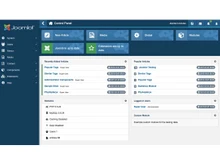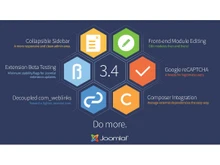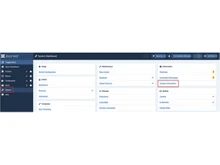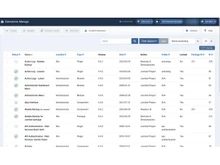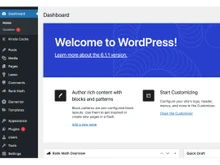When it comes to building and managing websites, two of the most commonly used content management systems (CMS) are WordPress and Joomla. They have powerful tools and customizations, plus support from their communities. But do they meet specific needs?
In this comparison, we’ll explore the pros & cons of Joomla and WordPress. We'll look at their strengths, weaknesses, & overall trends. This guide aims to help you decide by showing where each platform excels and where they fall short.
WordPress vs Joomla: Overview
WordPress came out in 2003, originally as a blogging platform. Now, it’s one of the most popular Content Management Systems (CMS). It holds an impressive market share with over 43.5% of websites using it today. Moreover, it leads the CMS market with a 62.7% share. WordPress is user-friendly, offers a huge ecosystem of plugins and themes, and has many support forums—making it ideal for both beginners & professionals.
On the other hand, Joomla quickly followed in WordPress’s footsteps and became the second most popular CMS in no time. Approximately 3% of all websites run on Joomla (which accounts for just 5.4% of CMS users). Joomla is known for its flexibility and advanced user management features among various other capabilities.
WordPress Pros and Cons
WordPress Pros:
- User-Friendly: WordPress is known for its intuitive interface, making it easy for even beginners to create and manage websites.
- Customizable: The platform offers a vast array of themes & plugins for extensive customization of your website’s look and functionality.
- SEO-Friendly: WordPress is designed with SEO in mind, WordPress makes it easier for websites to achieve better rankings in search engine results, aiding visibility.
- Community and Support: WordPress has a large and active community of users and developers, providing ample support and resources.
- Scalability: From small personal blogs to massive enterprise sites, WordPress can handle websites of any size without compromising performance.
WordPress Cons:
- Security: Although WordPress includes security features, it can be prone to attacks if not properly maintained & updated regularly.
- Performance: Large websites with many plugins or complex themes can experience slower loading times.
- Learning Curve: Despite its user-friendly nature, mastering advanced features and customizations can require considerable time and effort.
- Dependency on Plugins: Heavy reliance on plugins in many WordPress sites can lead to vulnerabilities or compatibility issues.
Joomla Pros:
- Flexibility: Joomla offers a high degree of flexibility, allowing you to create a wide range of website types, from simple blogs to complex e-commerce stores.
- Extensible: Like WordPress, Joomla has a vast ecosystem of extensions (similar to plugins) that can be used to add new features and functionality to your website.
- SEO-Friendly: Joomla is designed with SEO in mind, making it easier for your website to rank higher in search engine results.
- Security: Joomla has a strong focus on security, with regular updates and built-in security features.
Joomla Cons:
- Steeper Learning Curve: Compared to WordPress, Joomla can have a steeper learning curve, especially for beginners.
- Complexity: Joomla's flexibility can also make it more complex to use compared to simpler CMS options.
- Limited Market Share: Joomla has a smaller market share than WordPress, which can limit the availability of certain themes and plugins.
WordPress vs Joomla: in terms of Features
- Simplicity
- WordPress: Known for its user-friendliness, WordPress has a small learning curve, making it ideal for beginners. The interface is intuitive, and most users can get their website up and running quickly.
- Joomla: Joomla is more complex than WordPress, and it requires more time to learn. It offers more advanced features out of the box, but this comes with a steeper learning curve.
- Blogging
- WordPress: WordPress is perfect for blogging. It was originally designed as a blogging platform and continues to excel in this area, offering a seamless blogging experience.
- Joomla: Joomla is not as well-suited for blogging as WordPress. While it can handle blog posts, it lacks some of the built-in features and ease of use that WordPress offers for bloggers.
- Multi-Lingual Support
- WordPress: WordPress does not support multiple languages out of the box . However, this functionality can be added with plugins.
- Joomla: Joomla has built-in support for multiple languages, allowing users to easily manage multilingual content without needing additional extensions.
- Security
- WordPress: WordPress is built on secure code and is quick to respond to security threats. It offers auto-updates for security patches, ensuring that your site stays protected against vulnerabilities.
- Joomla: Joomla’s security features are similar to WordPress, with quick responses to threats. The Joomla team is proactive in addressing security issues and often provides patches to address vulnerabilities promptly.
- Database and Programming Languages
- WordPress: WordPress is written in PHP and primarily uses MySQL and MariaDB databases.
- Joomla: Joomla is also written in PHP but supports multiple databases, including MySQL, MS SQL, and PostgreSQL. It leverages OOP techniques and software design patterns for more complex web applications.
Market Trends: WordPress vs. Joomla
While WordPress continues to grow in popularity, Joomla has seen a decline in its user base. According to Google Trends, Joomla was on par with WordPress until 2010, after which WordPress surged ahead. Despite this, Joomla still offers powerful features that might appeal to specific use cases, especially for users looking for more control and customization options.
Joomla vs WordPress: Extensive Plugin Ecosystem
WordPress has a huge library of plugins and themes. You can easily extend your site’s functionality and design with these. Need SEO tools? There’s a plugin for that. Want e-commerce solutions or social media integration? Those plugins exist too.
Joomla offers around 8,000 extensions. That's less than WordPress but still plenty for customization. There isn’t an official template library, but many premium Joomla templates are available online. So, you have lots of choices for designing your site.
WordPress and Joomla: Customer Support
When it comes to customer support, WordPress benefits from a massive global community with extensive resources. This includes forums, tutorials, & third-party support services. Joomla also has a dedicated community. But it’s smaller in comparison, which might make it harder to find help quickly. However, Joomla's support is known for being more specialized. It’s particularly beneficial for advanced users.
Joomla vs WordPress: Pricing
Both WordPress and Joomla are open-source platforms, meaning they are free to use. Additional costs such as hosting, premium themes, plugins, or extensions might arise. For instance, Joomla offers subscriptions starting at $99/year for personal use. On the other hand, WordPress plugins and themes vary widely in price, starting at around $69/6 months for similar features. Pricing largely depends on the specific needs and scale of your website.
Which one is better: WordPress or Joomla?
Both WordPress and Joomla have their strengths. The right choice depends on your specific needs:
Choose WordPress if you’re looking for an easy-to-use, flexible CMS with a vast ecosystem of plugins & themes. It’s ideal for beginners, bloggers, & most small to medium-sized websites.
Choose Joomla if you need advanced user management, multilingual support, and greater flexibility in displaying non-standard content types. Joomla is well-suited for developers and those managing complex websites with specific customization requirements.


 10 Ratings & 10 Reviews
10 Ratings & 10 Reviews






